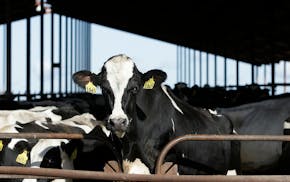WASHINGTON – Cargill Inc. joined a dozen other big corporations at the White House on Monday to sign a pledge to control climate change.
The private ceremony, hosted by Secretary of State John Kerry, committed the Minnetonka-based agricultural giant to increasing efforts to reduce greenhouse gas emissions and to supporting upcoming international negotiations on the issue.
Acknowledging that "delaying action on climate change will be costly in economic and human terms" puts Cargill and other pledge signers at odds with some in the business and political communities who insist climate change is not man made. It also puts the companies at odds with trade groups such as the U.S. Chamber of Commerce and the National Association of Manufacturers that are fighting hard against newly proposed Environmental Protection Agency rules to stem greenhouse gas emissions from coal-fired electric plants.
The Obama administration hopes the active participation of some of the America's top corporate players in its climate-change initiatives will drive home the importance of controlling climate change around the world.
Cargill joined the public charge against climate change more than a year ago when it signed on to a June 2014 report entitled "Risky Business: Our Nation's Economy at Risk from Climate Change." But its action Monday represents a more substantial move into the political arena. By openly aligning itself with the president, Cargill risks provoking the ire of Republicans who control the U.S. Senate and House.
"We need to take the politics out of it," Mike Fernandez, Cargill's vice president of corporate affairs, told the Star Tribune after meeting with Kerry. "We need to look beyond what is the cause of climate change and focus instead on how do we mitigate the outcomes that we're dealing with."
If Cargill doesn't address issues such as greenhouse gas reductions, renewable energy increases and deforestation, Fernandez said, the company will find itself "struggling in the future."
Cargill pledged new goals for addressing climate change by 2020 as its part of the American Business Act on Climate Pledge.
The company also agreed to push for a "strong outcome" in upcoming multicountry climate change negotiations in Paris.
The White House is also looking to companies like Cargill to recruit other U.S. businesses to the cause.
"We hope to see a broad commitment in the coming months," senior Obama adviser Brian Deese told reporters Monday.
Deese said the administration wants the 13 original signers of the pledge to "encourage companies in their supply chains to participate."
Besides Cargill, the other pledge signers are Alcoa, Apple, Bank of America, Berkshire Hathaway Energy, Coca-Cola, General Motors, Goldman Sachs, Google, Microsoft, PepsiCo, UPS and Wal-Mart.
Cargill said it is already reaching out.
"I've been in conversations with a number of our customers who weren't in the room today, who I would expect would be participating later in the game," Fernandez said.
The language of the pledge Cargill and other companies signed commits them to "accelerating the transition to a low-carbon economy" because doing so "will produce multiple benefits with regard to sustainable economic growth, public health, resilience to natural disasters, and the health of the global environment."
Acknowledging the destructiveness of climate change comes as some Republicans have gone out of their way to prevent teaching schoolchildren about the issue and others continue to question its existence. In a now famous display of skepticism, Republican Sen. James Inhofe of Oklahoma threw a snowball on to the Senate floor in February. Inhofe chairs the Senate's Environment and Public Works Committee.
In the face of such disdain, the American Business Act on Climate Pledge may inevitably involve politics.
Meanwhile, what the White House expects of those who sign are what Deese described as "accountable and verifiable goals." Progress on those goals will be checked in the private market by groups like the Carbon Disclosure Project, as well as corporate auditors, but not by a public agency.
Goals among the initial pledge participants vary.
For instance, using a 2005 baseline, Alcoa promises to reduce greenhouse gas emissions by 50 percent by 2025 and further promises that by 2025 the net reductions in its greenhouse gas emissions will be three times the emissions it creates in making products.
Berkshire Hathaway Energy will try to add 552 megawatts of wind power in Iowa in 2017 and "retire more than 75 percent of [its] coal-fueled generating capacity in Nevada by 2019."
Cargill's standards include a 5 percent reduction of greenhouse gas emissions from 2015 to 2020. In the past decade, the company reduced its carbon footprint by 9 percent. Also on tap for the next five years are 5 percent increases in freshwater efficiency and energy efficiency that add to earlier gains of 12 percent and 16 percent, respectively. The company further pledges to up its renewable energy use to 18 percent in 2020 from 14 percent in 2015.
In addition, Cargill intends to cut down on deforestation in its palm oil and soy bean businesses, and to change its beef operations to control greenhouse gases.
"For us, this isn't about politics," Fernandez explained. "This is about doing what's right by the environment but also trying to create a competitive advantage in the marketplace."
Jim Spencer • 202-383-6123
